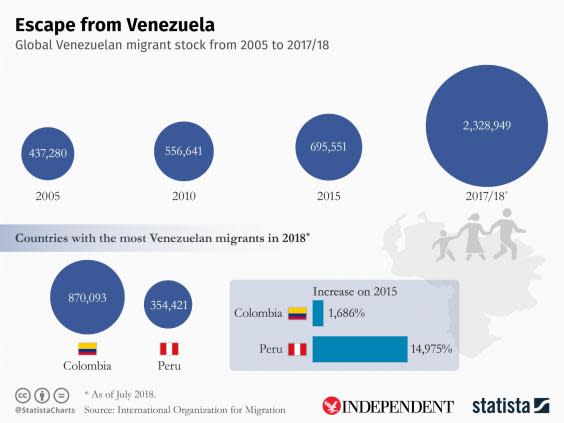Venezuela crisis: How Turkey has become the staunchest defender of president Nicolas Maduro
The US and Canada, and much of Latin America – with the exception of Mexico, Cuba and Bolivia – have lined up against the embattled Nicolas Maduro, now struggling to hang on as president of Venezuela. Russia – which has billions invested in the country – is the only world power that has come to its defence.
But Mr Maduro has found an unlikely in Nato and G-20 member Turkey and its president Recep Tayyip Erdogan, who has pulled out all stops in voicing support for the government in Caracas.
“Our president has called [Maduro] to express Turkey’s support,” Mr Erdogan’s spokesman Ibrahim Kalin wrote on Twitter.
“Brother Maduro, stand tall, Turkey stands with you,” he quoted Mr Erodgan as saying. “With President Erdogan’s leadership, Turkey will maintain its principled stance against all coup attempts.”
The unqualified support by Mr Erdogan for a Latin American leader 6,000 miles away raised eyebrows.
“If you follow foreign policy, it’s really quite strange to see such a strong relationship between Turkey and Venezuela,” said Emre Ersen, professor of international relations at Istanbul’s Marmara University.
Even Washington’s arch-nemesis Iran, which has ploughed billions in investments in Venezuela, took a restrained tone, calling for non-interference in the battle between Mr Maduro and the National Assembly president, Juan Guaido, who has been recognised as the country’s leader by Washington and Ottawa, as well as most of Latin America.
“We hope all disagreements and political problems in Venezuela are resolved as soon as possible by the people and the government of this country and through legal and peaceful methods,” Iran foreign ministry spokesman Bahram Qassemi said.
In contrast, Mr Erdogan and his supporters have enthusiastically supported Mr Maduro on social media. Of 137,000 tweets using the hashtag #WeAreMaduro, more than half were in Turkish. Less than a third were in Spanish, according to an analysis by the firm Spredfast.
They launched a coup attempt in Turkey and spilled blood. Now the US is carrying out a coup in Venezuela and the world is watching
Ersin Celik, editor of pro-government newspaper
Many Turks likened the unrest in Venezuela to the 2013 coup that toppled Egyptian Islamist Mohamed Morsi, and the attempted coup against Mr Erdogan by alleged supporters of US-based cleric Fethullah Gulen in 2016.
“They carried out a bloody coup in Egypt,” tweeted Ersin Celik, an editor of the pro-government Yeni Safak newspaper. “They launched a coup attempt in Turkey and spilled blood. Now the US is carrying out a coup in Venezuela and the world is watching.”

In Mr Maduro, Mr Erdogan, along with Mr Putin, may see a fellow traveller. His downfall could encourage other US foreign policy gambits. “If this gives the US or any other country the right to interfere in other countries’ leadership battles, that might be dangerous to Erdogan and others,” said Mr Ersen.
Personal ties might bind the two men. Mr Maduro and Mr Erdogan became close in 2016, during an energy conference in Istanbul.
Like Russia and Iran, Turkey also has significant economic ties to Venezuela, which since last year began using Turkey to process and certify gold ore in the face of US sanctions. Trade between the two countries has more than doubled over the last five years.
“They have good relations,” said Mr Ersen. “There might be some type of financial deal.”
But experts say there’s more to Mr Erdogan’s support for Mr Maduro than money or survival.
Though Turkey is ostensibly allied with the US in Nato, Mr Erdogan has pursued a populist agenda, and his rhetorical defiance of Washington plays well both among his supporters and secular critics, who also often see the US as a bloodthirsty imperial predator.
“He’s trying to keep the image that he’s a supporter of countries that are under pressure by the US both domestically and internationally,” said İlhan Uzgel, an Ankara-based international affairs scholar and columnist. “It helps to perpetuate his image as the protector of the oppressed.”
Mr Erdogan’s supporters in Turkey and among Islamists throughout the Arab world also consider Mr Maduro and his predecessor, Hugo Chavez, to be strong backers of the Palestinian cause, which is wildly popular among rank-and-file members of the Turkish president’s Justice and Development Party (AKP).
The AKP faces voters in 31 March municipal elections that will be the first since a financial meltdown last summer. Mr Erdogan’s support for Mr Maduro could help rally his party’s voters, but unlike the US, or Venezuela’s Latin American neighbours, Turkey doesn’t have the ability to alter events on the ground.
“The support will be confined to words only,” said Mr Uzgel. “Turkey does not have the means, instruments of power, or capacity to support the Maduro regime. It is a policy that does not have any cost. It’s easy to declare he supports Maduro, and that’s all.”
